
Spaniel
Encyclopedia
A spaniel is a type
of gun dog
. It is assumed spaniels originated from Spain
as the word spaniel may be derived from Hispania
(the Iberian Peninsula) or possibly from the French phrase "Chiens de l’Espagnol" (Dogs of the Spaniard). Spaniels were especially bred to flush game out of dense brush. By the late 17th century spaniels had become specialized into water and land breeds. The extinct English Water Spaniel
was used to retrieve water fowl shot down with arrows. Land spaniels were setting spaniels—those that crept forward and pointed
their game, allowing hunters to ensnare them with nets, and springing spaniels—those that sprang pheasants and partridges for hunting with falcons, and rabbits for hunting with greyhounds. During the 17th century, the role of the spaniel dramatically changed as Englishmen began hunting with flintlock
s for wing shooting. Charles Goodall and Julia Gasow (1984) write the spaniels were "transformed from untrained, wild beaters, to smooth, polished gun dogs."
defines Spaniel as "a breed of dog with a long silky coat and drooping ears".
Not much has changed about spaniels in general over the years, as can be seen in this 1921 entry in Collier's New Encyclopedia:
word espaigneul which meant "Spanish (dog)"; this in turn originated from the Latin
Hispaniolus which simply means "Spanish". In Edward, 2nd Duke of York
's work The Master of Game
, which was mostly a 15th century translation of an earlier work by Gaston III of Foix-Béarn
entitled Livre de chasse, Spaniels are described as being as much from Spain as you could consider all Greyhound
s to be from England
or Scotland
.
Sixteenth-century English physician John Caius
wrote that the spaniels of the time were mostly white, marked with spots that are commonly red. He described a new variety to have come out of France, which were speckled all over with white and black, "which mingled colours incline to a marble blewe".
as early as 900 BC by a branch of the Celts moving from Spain into Cornwall
and on into Wales
, England and Ireland
. Theories on the origin of the Welsh Springer Spaniel
support this theory, as it is believed that the breed specifically is a direct descendant of the "Agassian hunting dog" described in the hunting poem Cynegetica
attributed to Oppian of Apamea
, which belonged to the Celtic tribes of Roman-occupied Britain:
, by way of the trade routes to the far east
. Colonel David Hancock adds a belief that the sporting type of spaniel originated in China from the short-faced ancestors of dogs such as the Pekinese, Pug
and Shih Tzu
. The theory goes that these ancestors were introduced into Southern Europe and evolved into the small sporting spaniels of the period around 1300–1600 AD. The issue of how a short-muzzled dog could evolve into a longer-muzzled dog is addressed by pointing to the evolution of the King Charles Spaniel
into the Cavalier King Charles Spaniel
in less than a century.
is speculated to have originated in the middle east towards the end of the 11th century. French knights in the Holy Land
were accompanied by their pointers and other hunting hounds. Breeding between these dogs and the Arabic Greyhound
s was considered inevitable, and the progeny became the first French Spaniels.
On the basis of function and hunting style, the Fédération Cynologique Internationale
(FCI) draws a distinction between continental and Anglo-American spaniels. FCI places continental dogs of the spaniel type in the pointing group (Group 7, sect. 1.2) because they function more like setters which "freeze" and point to game. Breeds in this group include the Blue Picardy Spaniel, the French Spaniel
, the Brittany
, the Pont-Audemer Spaniel
, and the Small Münsterländer
. FCI classifies most other dogs of the spaniel type
as flushing or water dogs (Group 8, sections 2 and 3).
Dog type
Dog types are broad categories of dogs based on function, with dogs identified primarily by specific function or style of work rather than by lineage or appearance....
of gun dog
Gun dog
thumb|right|A group of Gun dogs as printed in Dogs of All Nations by W.E. Mason in 1915Gun dogs, also gundogs or bird dogs, are types of dogs developed to assist hunters in finding and retrieving game, usually birds. Gun dogs are divided into three primary types: Retrievers, flushing dogs, and...
. It is assumed spaniels originated from Spain
Spain
Spain , officially the Kingdom of Spain languages]] under the European Charter for Regional or Minority Languages. In each of these, Spain's official name is as follows:;;;;;;), is a country and member state of the European Union located in southwestern Europe on the Iberian Peninsula...
as the word spaniel may be derived from Hispania
Hispania
Another theory holds that the name derives from Ezpanna, the Basque word for "border" or "edge", thus meaning the farthest area or place. Isidore of Sevilla considered Hispania derived from Hispalis....
(the Iberian Peninsula) or possibly from the French phrase "Chiens de l’Espagnol" (Dogs of the Spaniard). Spaniels were especially bred to flush game out of dense brush. By the late 17th century spaniels had become specialized into water and land breeds. The extinct English Water Spaniel
English Water Spaniel
The English Water Spaniel is a breed of dog that has been extinct since the first part of the 20th century, with the last specimen seen in the 1930s. It was best known for its use in hunting waterfowl and for being able to dive as well as a duck...
was used to retrieve water fowl shot down with arrows. Land spaniels were setting spaniels—those that crept forward and pointed
Pointing breed
A pointing breed is a type of gundog typically used in finding game. Gundogs are traditionally divided into three classes: retrievers, flushing dogs, and pointing breeds. The name pointer comes from the dog's instinct to point, by stopping and aiming its muzzle towards game. This demonstrates to...
their game, allowing hunters to ensnare them with nets, and springing spaniels—those that sprang pheasants and partridges for hunting with falcons, and rabbits for hunting with greyhounds. During the 17th century, the role of the spaniel dramatically changed as Englishmen began hunting with flintlock
Flintlock
Flintlock is the general term for any firearm based on the flintlock mechanism. The term may also apply to the mechanism itself. Introduced at the beginning of the 17th century, the flintlock rapidly replaced earlier firearm-ignition technologies, such as the doglock, matchlock and wheellock...
s for wing shooting. Charles Goodall and Julia Gasow (1984) write the spaniels were "transformed from untrained, wild beaters, to smooth, polished gun dogs."
Definition and description
The Oxford English DictionaryOxford English Dictionary
The Oxford English Dictionary , published by the Oxford University Press, is the self-styled premier dictionary of the English language. Two fully bound print editions of the OED have been published under its current name, in 1928 and 1989. The first edition was published in twelve volumes , and...
defines Spaniel as "a breed of dog with a long silky coat and drooping ears".
Not much has changed about spaniels in general over the years, as can be seen in this 1921 entry in Collier's New Encyclopedia:
Their distinguishing characteristics are a rather broad muzzle, remarkably long and full ears, hair plentiful and beautifully waved, particularly that of the ears, tail, and hinder parts of the thighs and legs. The prevailing color is liver and white, sometimes red and white or black and white, and sometimes deep brown, or black on the face and breast, with a tan spot over each eye. The English spaniel is a superior and very pure breed. The King CharlesKing Charles SpanielThe King Charles Spaniel is a small dog breed of the spaniel type. In 1903, the Kennel Club combined four separate toy spaniel breeds under this single title...
is a small variety of the spaniel used as a lapdog. The water spaniels, large and small, differ from the common spaniel only in the roughness of their coats, and in uniting the aquatic propensities of the Newfoundland dogNewfoundland (dog)The Newfoundland is a breed of large dog. Newfoundlands can be black, brown, gray, or black and white. They were originally bred and used as a working dog for fishermen in the Dominion of Newfoundland, now part of Canada. They are known for their giant size, tremendous strength, calm dispositions,...
with the fine hunting qualities of their own race. Spaniels possess a great share of intelligence, affection, and obedience, which qualities, combined with much beauty, make them highly prized as companions.
History
The origin of the word spaniel is described by the Oxford English Dictionary as coming from the Old FrenchOld French
Old French was the Romance dialect continuum spoken in territories that span roughly the northern half of modern France and parts of modern Belgium and Switzerland from the 9th century to the 14th century...
word espaigneul which meant "Spanish (dog)"; this in turn originated from the Latin
Latin
Latin is an Italic language originally spoken in Latium and Ancient Rome. It, along with most European languages, is a descendant of the ancient Proto-Indo-European language. Although it is considered a dead language, a number of scholars and members of the Christian clergy speak it fluently, and...
Hispaniolus which simply means "Spanish". In Edward, 2nd Duke of York
Edward of Norwich, 2nd Duke of York
Sir Edward of Norwich, 2nd Duke of York, 2nd Earl of Cambridge, Earl of Rutland, Earl of Cork, Duke of Aumale KG was a member of the English royal family who died at the Battle of Agincourt....
's work The Master of Game
The Master of Game
The Master of Game is a medieval book on hunting written by Edward of Norwich, 2nd Duke of York, between 1406 and 1413, of which 27 manuscripts survive. It is considered to be the oldest English-language book on hunting...
, which was mostly a 15th century translation of an earlier work by Gaston III of Foix-Béarn
Gaston III of Foix-Béarn
Gaston III/X of Foix-Béarn, also Gaston Fébus or Gaston Phoebus was the 11th count of Foix, and viscount of Béarn . Officially, he was Gaston III of Foix and Gaston X of Béarn.-Early life:...
entitled Livre de chasse, Spaniels are described as being as much from Spain as you could consider all Greyhound
Greyhound
The Greyhound is a breed of sighthound that has been primarily bred for coursing game and racing, and the breed has also recently seen a resurgence in its popularity as a pedigree show dog and family pet. It is a gentle and intelligent breed...
s to be from England
England
England is a country that is part of the United Kingdom. It shares land borders with Scotland to the north and Wales to the west; the Irish Sea is to the north west, the Celtic Sea to the south west, with the North Sea to the east and the English Channel to the south separating it from continental...
or Scotland
Scotland
Scotland is a country that is part of the United Kingdom. Occupying the northern third of the island of Great Britain, it shares a border with England to the south and is bounded by the North Sea to the east, the Atlantic Ocean to the north and west, and the North Channel and Irish Sea to the...
.
Sixteenth-century English physician John Caius
John Caius
John Caius , also known as Johannes Caius, was an English physician, and second founder of the present Gonville and Caius College, Cambridge.-Early years:...
wrote that the spaniels of the time were mostly white, marked with spots that are commonly red. He described a new variety to have come out of France, which were speckled all over with white and black, "which mingled colours incline to a marble blewe".
Celtic origin theory
In the added appendices added to the 1909 re-print of Caius' work, the editors suggested that the type of dogs may have been brought into the British IslesBritish Isles
The British Isles are a group of islands off the northwest coast of continental Europe that include the islands of Great Britain and Ireland and over six thousand smaller isles. There are two sovereign states located on the islands: the United Kingdom of Great Britain and Northern Ireland and...
as early as 900 BC by a branch of the Celts moving from Spain into Cornwall
Cornwall
Cornwall is a unitary authority and ceremonial county of England, within the United Kingdom. It is bordered to the north and west by the Celtic Sea, to the south by the English Channel, and to the east by the county of Devon, over the River Tamar. Cornwall has a population of , and covers an area of...
and on into Wales
Wales
Wales is a country that is part of the United Kingdom and the island of Great Britain, bordered by England to its east and the Atlantic Ocean and Irish Sea to its west. It has a population of three million, and a total area of 20,779 km²...
, England and Ireland
Ireland
Ireland is an island to the northwest of continental Europe. It is the third-largest island in Europe and the twentieth-largest island on Earth...
. Theories on the origin of the Welsh Springer Spaniel
Welsh Springer Spaniel
The Welsh Springer Spaniel is a breed of dog and a member of the spaniel family. Thought to be comparable to the old Land Spaniel, they are similar to the English Springer Spaniel and historically have been referred to as both the Welsh Spaniel and the Welsh Cocker Spaniel...
support this theory, as it is believed that the breed specifically is a direct descendant of the "Agassian hunting dog" described in the hunting poem Cynegetica
Oppian
Oppian or Oppianus was the name of the authors of two didactic poems in Greek hexameters, formerly identified, but now generally regarded as two different persons: Oppian of Corycus in Cilicia; and Oppian of Apamea in Syria.-Oppian of Corycus:Oppian of Corycus in Cilicia, who flourished in the...
attributed to Oppian of Apamea
Oppian
Oppian or Oppianus was the name of the authors of two didactic poems in Greek hexameters, formerly identified, but now generally regarded as two different persons: Oppian of Corycus in Cilicia; and Oppian of Apamea in Syria.-Oppian of Corycus:Oppian of Corycus in Cilicia, who flourished in the...
, which belonged to the Celtic tribes of Roman-occupied Britain:
"There is a strong breed of hunting dog, small in size but no less worthy of great praise. These the wild tribes of Britons with their tattooed backs rear and call by the name of Agassian. Their size is like that of worthless and greedy domestic table dogs; squat, emanciated, shaggy, dull of eye, but endowed with feet armed with powerful claws and a mouth sharp with close-set venomous tearing teeth. It is by virtue of its nose, however, that the Agassian is most exalted, and for tracking it is the best there is; for it is very adept at discovering the tracks of things that walk upon the ground, and skilled too at marking the airborne scent."
Roman origin theory
Another theory of the origin of the spaniel is that the ancient Romans imported the Spaniel into BritanniaBritannia
Britannia is an ancient term for Great Britain, and also a female personification of the island. The name is Latin, and derives from the Greek form Prettanike or Brettaniai, which originally designated a collection of islands with individual names, including Albion or Great Britain. However, by the...
, by way of the trade routes to the far east
Far East
The Far East is an English term mostly describing East Asia and Southeast Asia, with South Asia sometimes also included for economic and cultural reasons.The term came into use in European geopolitical discourse in the 19th century,...
. Colonel David Hancock adds a belief that the sporting type of spaniel originated in China from the short-faced ancestors of dogs such as the Pekinese, Pug
Pug
The pug is a "toy" breed of dog with a wrinkly, short-muzzled face, and curled tail. The breed has a fine, glossy coat that comes in a variety of colors, and a compact square body with well-developed muscle. They have been described as multum in parvo , referring to the pug's personality and...
and Shih Tzu
Shih Tzu
The Shih Tzu is a breed of dog weighing with long silky hair. The breed originated in China and is among the earliest breeds. Shih Tzu were officially recognized by the American Kennel Club in 1969...
. The theory goes that these ancestors were introduced into Southern Europe and evolved into the small sporting spaniels of the period around 1300–1600 AD. The issue of how a short-muzzled dog could evolve into a longer-muzzled dog is addressed by pointing to the evolution of the King Charles Spaniel
King Charles Spaniel
The King Charles Spaniel is a small dog breed of the spaniel type. In 1903, the Kennel Club combined four separate toy spaniel breeds under this single title...
into the Cavalier King Charles Spaniel
Cavalier King Charles Spaniel
The Cavalier King Charles Spaniel is a small breed of Spaniel-type dog, and is classed as a toy dog by most kennel clubs. It is one of the most popular breeds in the United Kingdom. Since 2000, it has been growing in popularity in the United States. It is a smaller breed of spaniel, and Cavalier...
in less than a century.
Arabic origin theory
The first French SpanielFrench Spaniel
The French Spaniel is a breed of dog of the Spaniel type. It was developed in France as a hunting dog, descended from dogs of the 14th century. Popular with royalty during the Middle Ages, it nearly became extinct by the turn of the 20th century but was saved by the efforts of Father Fournier, a...
is speculated to have originated in the middle east towards the end of the 11th century. French knights in the Holy Land
Holy Land
The Holy Land is a term which in Judaism refers to the Kingdom of Israel as defined in the Tanakh. For Jews, the Land's identifiction of being Holy is defined in Judaism by its differentiation from other lands by virtue of the practice of Judaism often possible only in the Land of Israel...
were accompanied by their pointers and other hunting hounds. Breeding between these dogs and the Arabic Greyhound
Greyhound
The Greyhound is a breed of sighthound that has been primarily bred for coursing game and racing, and the breed has also recently seen a resurgence in its popularity as a pedigree show dog and family pet. It is a gentle and intelligent breed...
s was considered inevitable, and the progeny became the first French Spaniels.
Hunting
In assisting hunters, it is desirable that Spaniels work within gun range, are steady to shot, are able to mark the fall and retrieve shot game to hand with a soft mouth. A good nose is highly valued, as it is in most gun dog breeds. They are versatile hunters traditionally being used for upland game birds, but are equally adept at hunting rabbit and waterfowl. Whether hunting in open fields, woodlands, farm lands - in briars, along fencerows or marshlands, a spaniel can get the job done.On the basis of function and hunting style, the Fédération Cynologique Internationale
Fédération Cynologique Internationale
Fédération Cynologique Internationale is an international federation of kennel clubs based in Thuin, Belgium. The English language translation, World Canine Organisation, is not often used.Its goals are described in Article 2 of their regulations:...
(FCI) draws a distinction between continental and Anglo-American spaniels. FCI places continental dogs of the spaniel type in the pointing group (Group 7, sect. 1.2) because they function more like setters which "freeze" and point to game. Breeds in this group include the Blue Picardy Spaniel, the French Spaniel
French Spaniel
The French Spaniel is a breed of dog of the Spaniel type. It was developed in France as a hunting dog, descended from dogs of the 14th century. Popular with royalty during the Middle Ages, it nearly became extinct by the turn of the 20th century but was saved by the efforts of Father Fournier, a...
, the Brittany
Brittany (dog)
The Brittany is a breed of gun dog bred primarily for bird hunting. Although the Brittany is often referred to as a Spaniel, the breed's working characteristics are more akin to those of a pointer or setter.-History:...
, the Pont-Audemer Spaniel
Pont-Audemer Spaniel
The Pont-Audemer Spaniel or Epagneul Pont-Audemer is a breed of gundogwhich is virtually unknown outside of its native country of France.-Appearance:...
, and the Small Münsterländer
Small Munsterlander
The Small Munsterlander is a versatile hunting-pointing-retrieving dog breed that reached its current form in the area around Münster, Germany. The Large Munsterlander is from the same area, but was developed from different breeding stock and is not related as the names would suggest...
. FCI classifies most other dogs of the spaniel type
Dog type
Dog types are broad categories of dogs based on function, with dogs identified primarily by specific function or style of work rather than by lineage or appearance....
as flushing or water dogs (Group 8, sections 2 and 3).
Contemporary
| Type of Spaniel | Also Known As | Country/Region of Origin | Min. Height | Max. Height | Min. Weight | Max. Weight | Image |
|---|---|---|---|---|---|---|---|
| American Cocker Spaniel American Cocker Spaniel The American Cocker Spaniel is a breed of sporting dog. It is a spaniel type dog that is closely related to the English Cocker Spaniel; the two breeds diverged during the 20th century due to differing breed standards in America and the UK... |
Cocker Spaniel (in the United States) |
United States | 13 in (33 cm) | 15 in (38.1 cm) | 24 lb (10.9 kg) | 29 lb (13.2 kg) | |
| American Water Spaniel American Water Spaniel The American Water Spaniel, , is a breed of spaniel which is one of a small number of breeds originating in the United States. Developed in the state of Wisconsin during the 19th century from a number of other breeds, including the Irish and English Water Spaniels. The breed was saved by Dr. Fred J... |
United States | 15 in (38.1 cm) | 18 in (45.7 cm) | 25 lb (11.3 kg) | 45 lb (20.4 kg) | 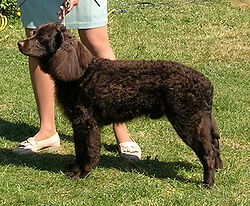 |
|
| Blue Picardy Spaniel | Epagneul Bleu de Picardi | France | 22 in (55.9 cm) | 24 in (61 cm) | 43 lb (19.5 kg) | 45 lb (20.4 kg) | 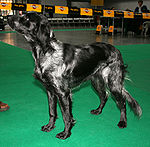 |
| Boykin Spaniel Boykin Spaniel Discovered and further developed by South Carolina hunters for hunters in the 1900s, the Boykin Spaniel is a medium-sized breed of dog, a Spaniel bred for hunting wild turkeys and ducks in the Wateree River Swamp of South Carolina, in the United States... |
United States | 15 in (38.1 cm) | 18 in (45.7 cm) | 25 lb (11.3 kg) | 45 lb (20.4 kg) | 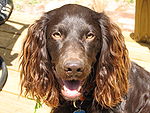 |
|
| Brittany Brittany (dog) The Brittany is a breed of gun dog bred primarily for bird hunting. Although the Brittany is often referred to as a Spaniel, the breed's working characteristics are more akin to those of a pointer or setter.-History:... |
Brittany Spaniel | France | 17.5 in (44.5 cm) | 20.5 in (52.1 cm) | 30 lb (13.6 kg) | 40 lb (18.1 kg) | 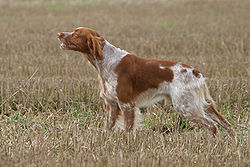 |
| Cavalier King Charles Spaniel Cavalier King Charles Spaniel The Cavalier King Charles Spaniel is a small breed of Spaniel-type dog, and is classed as a toy dog by most kennel clubs. It is one of the most popular breeds in the United Kingdom. Since 2000, it has been growing in popularity in the United States. It is a smaller breed of spaniel, and Cavalier... |
England | 12 in (30.5 cm) | 13 in (33 cm) | 13 lb (5.9 kg) | 18 lb (8.2 kg) | ||
| Clumber Spaniel Clumber Spaniel The Clumber Spaniel is a breed of dog of the spaniel type, developed in the United Kingdom. It is the largest of the spaniels, and comes in predominantly one colour. The name of the breed is taken from Clumber Park in Nottinghamshire. It is a gundog that specialises in hunting in heavy cover. They... |
England | 17 in (43.2 cm) | 20 in (50.8 cm) | 55 lb (24.9 kg) | 85 lb (38.6 kg)} | 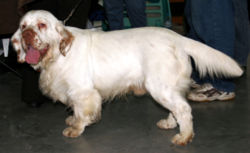 |
|
| Drentse Patrijshond Drentse Patrijshond The Drentsche Patrijshond is a versatile spaniel-type hunting dog from the Dutch province of Drenthe. Called the Dutch Partridge Dog in English, approximately 5,000 dogs are registered with the breed club in the Netherlands, and breed clubs operate in Belgium, Denmark, Scandinavia and North America... |
Dutch Partridge Dog | Netherlands | 21.5 in (54.6 cm) | 25.5 in (64.8 cm) | 55 lb (24.9 kg) | 77 lb (34.9 kg) | 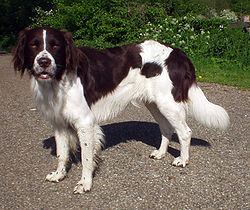 |
| English Cocker Spaniel English Cocker Spaniel The English Cocker Spaniel is a breed of gun dog. The English Cocker Spaniel is an active, good-natured, sporting dog, standing well up at the withers and compactly built. There are "field" or "working" cockers and "show" cockers... |
Cocker Spaniel (In the United Kingdom United Kingdom The United Kingdom of Great Britain and Northern IrelandIn the United Kingdom and Dependencies, other languages have been officially recognised as legitimate autochthonous languages under the European Charter for Regional or Minority Languages... ) |
England | 15 in (38.1 cm) | 17 in (43.2 cm) | 26 lb (11.8 kg) | 34 lb (15.4 kg) | |
| English Springer Spaniel English Springer Spaniel The English Springer Spaniel is a breed of gun dog traditionally used for flushing and retrieving game. It is an affectionate, excitable breed with an average lifespan of twelve to fourteen years. Descended from the Norfolk or Shropshire Spaniels of the mid-19th century, the breed has diverged into... |
England | 19 in (48.3 cm) | 20 in (50.8 cm) | 40 lb (18.1 kg) | 50 lb (22.7 kg) | 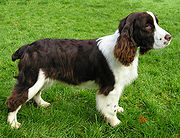 |
|
| Field Spaniel Field Spaniel The Field Spaniel is a medium-sized breed dog of the spaniel type. They were originally developed to be all black show dogs in the late 19th and early 20th centuries and were unpopular for work as a hunting dog. However during the mid 20th century they were redeveloped as a longer legged dog that... |
England | 17 in (43.2 cm) | 18 in (45.7 cm) | 35 lb (15.9 kg) | 50 lb (22.7 kg) | 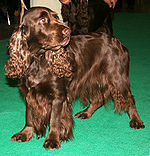 |
|
| French Spaniel French Spaniel The French Spaniel is a breed of dog of the Spaniel type. It was developed in France as a hunting dog, descended from dogs of the 14th century. Popular with royalty during the Middle Ages, it nearly became extinct by the turn of the 20th century but was saved by the efforts of Father Fournier, a... |
Epagneul Français | France | 21 in (53.3 cm) | 24 in (61 cm) | 50 lb (22.7 kg) | 70 lb (31.8 kg) | 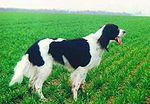 |
| German Spaniel German Spaniel The German Spaniel, also known as the Deutscher Wachtelhund, is a breed of dog that was developed in Germany around 1890, and is used as a hunting dog. Descended from the old German breed, the Stoeberer, which became popular with commoners following the Revolutions of 1848 in the German states, who... |
Deutscher Wachtelhund | Germany | 16 in (40.6 cm) | 20 in (50.8 cm) | 44 lb (20 kg) | 66 lb (29.9 kg) | |
| Irish Water Spaniel Irish Water Spaniel The Irish Water Spaniel is a breed of dog that is the largest and one of the oldest of spaniels.The Irish Water Spaniel is considered one of the rarer breeds with the AKC in terms of registrations but is still widely respected and sought-after for its unusual qualities.-Appearance:The Irish Water... |
Ireland | 21 in (53.3 cm) | 24 in (61 cm) | 45 lb (20.4 kg) | 65 lb (29.5 kg) | 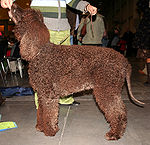 |
|
| King Charles Spaniel King Charles Spaniel The King Charles Spaniel is a small dog breed of the spaniel type. In 1903, the Kennel Club combined four separate toy spaniel breeds under this single title... |
English Toy Spaniel (in the United States) |
England | 9 in (22.9 cm) | 10 in (25.4 cm) | 6 lb (2.7 kg) | 12 lb (5.4 kg) | |
| Kooikerhondje | Netherlands | 14 in (35.6 cm) | 16 in (40.6 cm) | 20 lb (9.1 kg) | 24 lb (10.9 kg) | ||
| Large Münsterländer Large Munsterlander The Large Munsterlander is a breed of gun dog originally from the Münster region in Germany.The Kennel Club in England recognised the breed in 1919 and established the breed standard in 1921.-Appearance:... |
Großer Münsterländer | Germany | 23 in (58.4 cm) | 25 in (63.5 cm) | 55 lb (24.9 kg) | 70 lb (31.8 kg) | 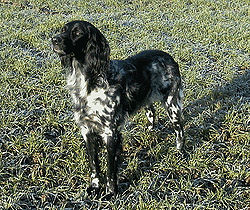 |
| Papillon Papillon (dog) The papillon , also called the Continental Toy Spaniel, is a breed of dog of the Spaniel type. One of the oldest of the toy Spaniels, it derives its name from its characteristic butterfly-like look of the long and fringed hair on the ears. A papillon with dropped ears is called a phalène... |
Continental Toy Spaniel, Épagneul Nain Continental |
France | 8 in (20.3 cm) | 11 in (27.9 cm) | 5 lb (2.3 kg) | 10 lb (4.5 kg) | |
| Phalène Phalène The Phalène is the drop-eared version of the Papillon, a toy breed also known as the Butterfly Dog or the Continental Toy Spaniel .-History:... |
Continental Toy Spaniel, Épagneul Nain Continental |
Belgium | 8 in (20.3 cm) | 11 in (27.9 cm) | 5 lb (2.3 kg) | 10 lb (4.5 kg) | |
| Picardy Spaniel Picardy Spaniel The Picardy Spaniel is a breed of dog developed in France for use as a gundog. It is related to the Blue Picardy Spaniel, and still has many similarities, but the Picardy Spaniel is the older of the two breeds... |
Épagneul Picard | France | 22 in (55.9 cm) | 23.5 in (59.7 cm) | 44 lb (20 kg) | 55 lb (24.9 kg) | 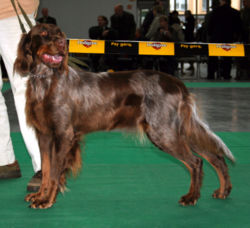 |
| Pont-Audemer Spaniel Pont-Audemer Spaniel The Pont-Audemer Spaniel or Epagneul Pont-Audemer is a breed of gundogwhich is virtually unknown outside of its native country of France.-Appearance:... |
Épagneul Pont-Audemer | France | 20 in (50.8 cm) | 23 in (58.4 cm) | 40 lb (18.1 kg) | 53 lb (24 kg) | 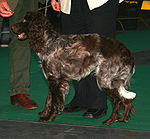 |
| Russian Spaniel Russian Spaniel The Russian Spaniel is a type of spaniel first standardised in 1951 in the Soviet Union after World War II by cross breeding English Cocker Spaniels, English Springer Spaniels and other spaniel breeds. Physically it is similar to a Cocker Spaniel, but has a shorter, tighter coat and a longer body... |
Russian hunting spaniel (Русский охотничий спаниель) |
Russia | 15 in (38.1 cm) | 17 in (43.2 cm) | 28 lb (12.7 kg) | 40 lb (18.1 kg) | 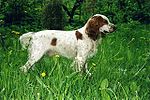 |
| Small Münsterländer Small Munsterlander The Small Munsterlander is a versatile hunting-pointing-retrieving dog breed that reached its current form in the area around Münster, Germany. The Large Munsterlander is from the same area, but was developed from different breeding stock and is not related as the names would suggest... |
Kleiner Münsterländer | Germany | 19 in (48.3 cm) | 22 in (55.9 cm) | 30 lb (13.6 kg) | 38 lb (17.2 kg) | 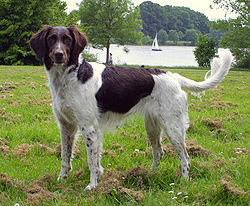 |
| Sussex Spaniel Sussex Spaniel The Sussex Spaniel is a breed of dog developed in Sussex in southern England. It is a low, compact spaniel and is similar in appearance to the Clumber Spaniel. They can be slow paced, but can have a clownish and energetic temperament... |
England | 13 in (33 cm) | 15 in (38.1 cm) | 35 lb (15.9 kg) | 44 lb (20 kg) |  |
|
| Welsh Springer Spaniel Welsh Springer Spaniel The Welsh Springer Spaniel is a breed of dog and a member of the spaniel family. Thought to be comparable to the old Land Spaniel, they are similar to the English Springer Spaniel and historically have been referred to as both the Welsh Spaniel and the Welsh Cocker Spaniel... |
Wales | 17 in (43.2 cm) | 19 in (48.3 cm) | 35 lb (15.9 kg) | 55 lb (24.9 kg) | ||
Extinct
| Type of Spaniel | Country/Region of origin | Period of extinction | Image |
|---|---|---|---|
| Alpine Spaniel Alpine Spaniel The Alpine Spaniel is an extinct breed of dog which was used in mountain rescues by the Augustinian Canons, who run hospices in the region around the Great St. Bernard Pass. The spaniel was a large dog notable for its thick curly coat... |
Switzerland | 1830s | |
| English Water Spaniel English Water Spaniel The English Water Spaniel is a breed of dog that has been extinct since the first part of the 20th century, with the last specimen seen in the 1930s. It was best known for its use in hunting waterfowl and for being able to dive as well as a duck... |
England | 1930s | 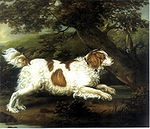 |
| Norfolk Spaniel Norfolk Spaniel The Norfolk Spaniel or Shropshire Spaniel is a breed of dog extinct since the early 20th century. It was originally thought to have originated from the work of one of the Dukes of Norfolk but this theory was disproven after being in doubt during the later part of the 19th century... |
England | 1902 | 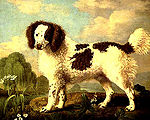 |
| Toy Trawler Spaniel Toy Trawler Spaniel The Toy Trawler Spaniel is an extinct breed of Spaniel which physically was similar to the King Charles Spaniel of the 16th century. It is considered to have descended from the original King Charles Spaniel, and the older variety of Sussex Spaniel. It was originally used as a sporting dog, but... |
United Kingdom | 1920s | |
| Tweed Water Spaniel Tweed Water Spaniel The Tweed Water Spaniel, or Tweed Spaniel, is a breed of dog extinct since the 19th century. It is most well known for being involved in the early development of the modern Curly Coated Retriever and Golden Retriever breeds of dog... |
England | 19th century |  |
Misnamed
The following breeds are not true spaniels, but are named as such due to their resemblance to the spaniels.| Type of Spaniel | Also Known As | Country/Region of Origin | Min. Height | Max. Height | Min. Weight | Max. Weight | Image |
|---|---|---|---|---|---|---|---|
| Japanese Chin Japanese Chin The Japanese Chin , also known as the Japanese Spaniel) is the dog of Japanese royalty. A lap dog and companion dog, this toy breed has a distinctive heritage.-Appearance:... |
Japanese Spaniel | Japan | 9 in (22.9 cm) | 10 in (25.4 cm) | 4 lb (1.8 kg) | 11 lb (5 kg) | |
| Pekingese Pekingese The Pekingese, or "Peke" is an ancient breed of toy dog, originating in China. The breed was favored by the Chinese Imperial court, and its name refers to the city of Beijing where the Forbidden City resides... |
Chinese Spaniel | China | 8 in (20.3 cm) | 9 in (22.9 cm) | 8 lb (3.6 kg) | 14 lb (6.4 kg) | |
| Tibetan Spaniel Tibetan Spaniel The Tibetan Spaniel is a breed of assertive, small, intelligent dogs originating in the Himalayan mountains of Tibet. They share ancestry with the Pekingese, Japanese Chin, Shih Tzu, Lhasa Apso, and Pug... |
Tibet | 9 in (22.9 cm) | 11 in (27.9 cm) | 9 lb (4.1 kg) | 15 lb (6.8 kg) | 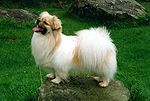 |
|
See also
- Hunting dogHunting dogA hunting dog refers to any dog who assists humans in hunting. There are several types of hunting dogs developed for various tasks. The major categories of hunting dogs include hounds, terriers, dachshunds, cur type dogs, and gun dogs...
- List of dog types for a list of dog types
- List of dog breeds for a complete list of breeds

